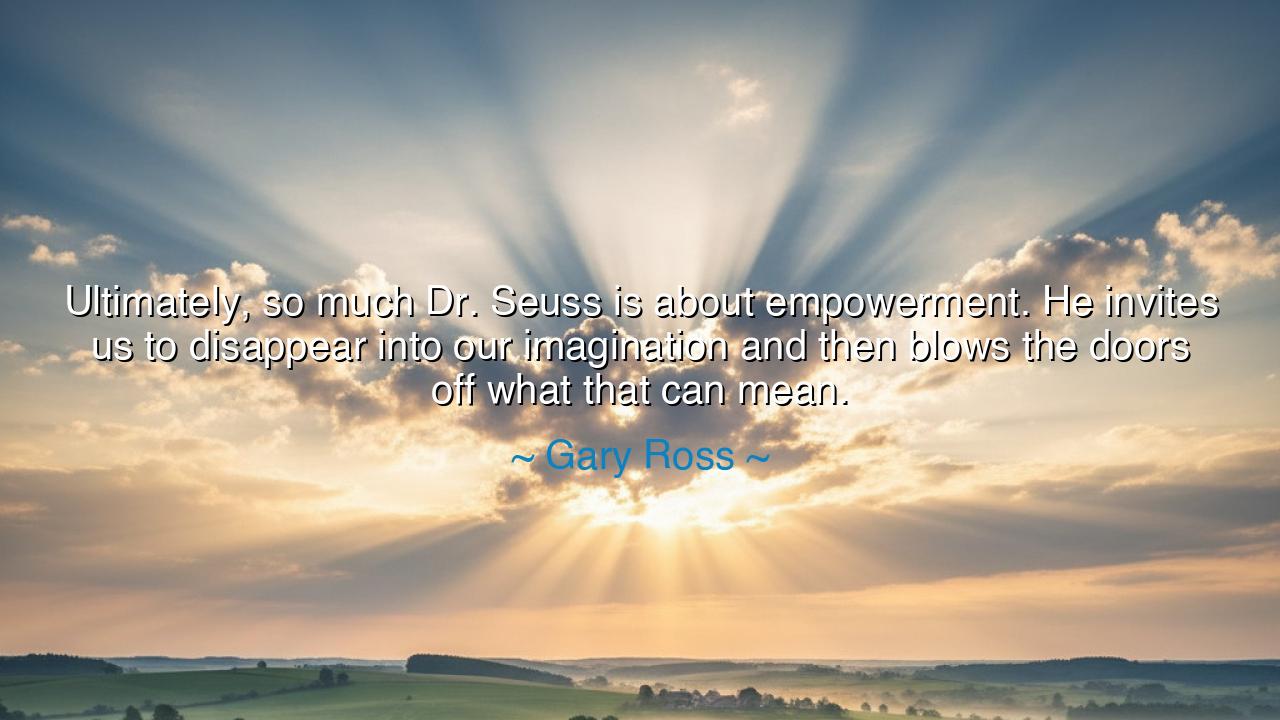
Ultimately, so much Dr. Seuss is about empowerment. He invites us
Ultimately, so much Dr. Seuss is about empowerment. He invites us to disappear into our imagination and then blows the doors off what that can mean.






“Ultimately, so much Dr. Seuss is about empowerment. He invites us to disappear into our imagination and then blows the doors off what that can mean.” Thus spoke Gary Ross, the storyteller of modern cinema, whose words echo with both admiration and insight. In this reflection, he reveals not merely the genius of Dr. Seuss, but a deeper truth about the nature of imagination itself — that it is not an escape from life, but an awakening within it. The imagination, when used fully, does not confine us to fantasy; it liberates us to see reality anew, and to shape it with courage and joy.
To disappear into the imagination is not to flee the world, but to enter it more deeply — to move beyond its dull appearances and discover its living essence. When Ross speaks of Seuss “blowing the doors off what that can mean,” he points to the explosive power of imagination to transcend limits — to teach children and adults alike that what is impossible is only what has not yet been dreamed. The worlds of Dr. Seuss — with their Whos, Loraxes, and Sneetches — are not mere nonsense; they are the grand allegories of freedom, of creativity, of becoming. In them, we learn that empowerment begins when we dare to imagine differently.
The ancients, too, understood that imagination was the spark of the divine within humanity. The poets of Greece called it phantasia — the sacred vision that allows mortals to see beyond sight, to envision what the gods might dream. Plato, in his wisdom, saw it as both dangerous and holy: dangerous because it could deceive, holy because it could create. And Dr. Seuss, in his childlike genius, harnessed that same divine force — turning rhyme into revelation, play into prophecy. His stories teach that through imagination, one becomes powerful not by control, but by understanding; not by conformity, but by wonder.
Consider the child, seated cross-legged with a Seuss book in hand. To that child, each page is a portal — not only to whimsy, but to awakening. The Cat in the Hat teaches courage and rebellion; Horton teaches compassion and faithfulness; The Lorax speaks the truth of stewardship and the soul’s responsibility to the earth. Through laughter and rhythm, Seuss whispers the same message that prophets and poets have spoken for millennia: You are capable of more than you believe. The limits of the world are not your prison — they are your canvas. This is the empowerment Ross celebrates — the transformation of the reader from passive observer into creative participant in the vast play of existence.
In history, many have lived by this law of the imagination. One might recall Walt Disney, who, like Seuss, transformed his dreams into worlds. His parks, his films, his very empire were born not from logic or strategy, but from the audacity to dream beyond the known. He, too, invited humanity to “disappear into imagination,” and by doing so, reshaped reality itself. Or consider Leonardo da Vinci, whose notebooks overflowed with visions that centuries later became truth — flying machines, armored vehicles, designs of science and art fused into one. These souls, like Seuss, understood that to imagine is not to wander idly, but to create consciously.
And yet, Ross’s words also carry a warning — that to be empowered by imagination, one must not fear it. Many, when faced with the vastness of possibility, retreat into comfort, preferring the narrow certainty of what is known. But the true power of the imagination lies in its ability to unsettle, to transform, to lead us into regions where rules dissolve and meaning must be remade. To “blow the doors off what that can mean” is to awaken to the truth that imagination is not child’s play — it is the work of the spirit. It challenges us to see not only new worlds, but new selves.
Thus, the lesson of Gary Ross’s reflection — and of Dr. Seuss’s art — is one of courage. Do not suppress the imagination in favor of practicality; do not fear its wildness. Let it lead you to places unknown, for in those places lies growth. Practice wonder as a discipline; make curiosity your craft. Read, dream, question, create. Build not only with hands, but with heart and vision. For the greatest empowerment is not found in control over others, but in the mastery of one’s own imagination, that divine engine of possibility.
And so, remember the wisdom of these words: imagination is not an escape from life, but the expansion of it. Let it be your teacher, your companion, your power. Like the heroes of Dr. Seuss, dare to think, dare to dream, dare to act — and when the world seems small, blow the doors off what that can mean. For in the end, to live imaginatively is to live freely — and to live freely is to honor the divine spark of creation within us all.






AAdministratorAdministrator
Welcome, honored guests. Please leave a comment, we will respond soon